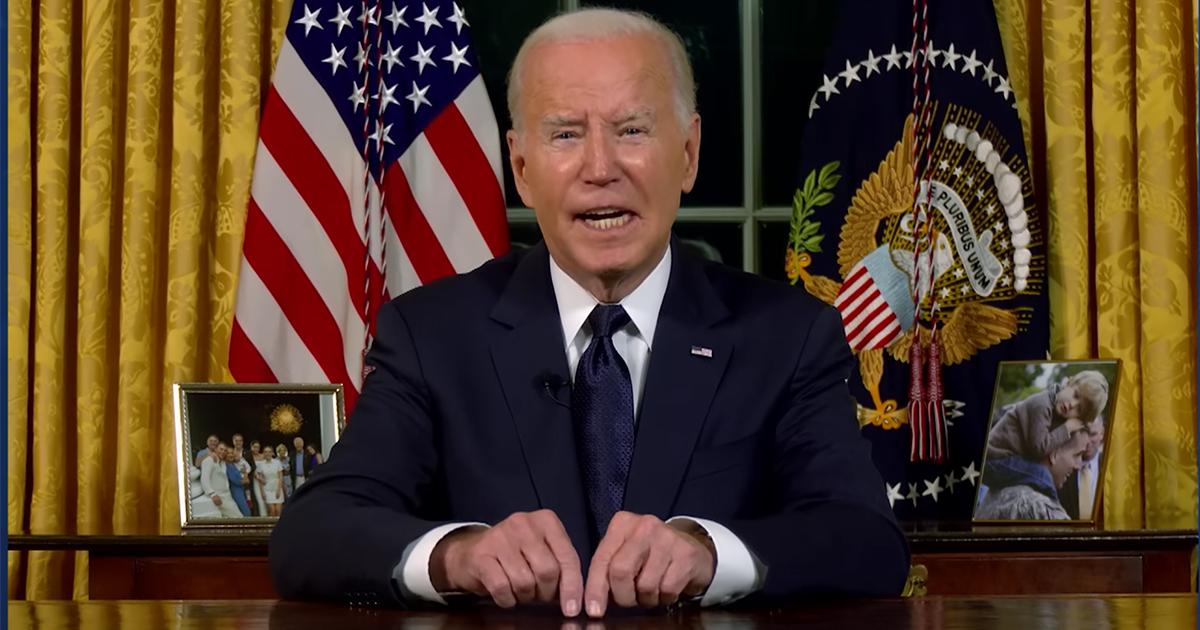As the long-hyped Ukrainian counteroffensive against Russia stalls and a new war in Gaza draws the world’s attention, American support for funding Kyiv’s war has waned. In an effort to reverse this, the Biden administration is changing its messaging. A Politico report from last week details how White House aides are now telling members of Congress to sell Americans the lie that continuing to send money and weapons to Ukraine is good for the economy.
President Joe Biden made this point himself when he introduced a $105 billion proposal to send military aid to Ukraine, Israel, and Taiwan:
We send Ukraine equipment sitting in our stockpiles. And when we use the money allocated by Congress, we use it to replenish our own stores, our own stockpiles, with new equipment. Equipment that defends America and is made in America. Patriot missiles for air defense batteries, made in Arizona. Artillery shells manufactured in 12 states across the country, in Pennsylvania, Ohio, Texas. And so much more.
With this new talking point, the Biden administration is echoing Senator Mitch McConnell, who has for months been saying that the war in Ukraine is an excellent deal because American companies get paid, the Russian regime is weakened, and only Ukrainians have to die.
Setting aside the morality or practicality of Biden and McConnell’s foreign policy ambitions, the argument that all this military spending is good for the American economy relies on one of the oldest, most pervasive economic fallacies in our political discourse—the broken window fallacy.
First outlined by French economist Frédéric Bastiat in his essay “That Which Is Seen and That Which Is Not Seen” and later expounded upon by economic journalist Henry Hazlitt in his book Economics in One Lesson, the broken window fallacy is the false belief that spending money on restoring things that have been destroyed can make an economy richer.
To make this point, Bastiat used the example of a broken shop window. After his careless son breaks a pane of glass, a shopkeeper is forced to hire a glazier to repair the damage. A group of bystanders reflect on the situation and question their impulse to condemn the boy. After all, they ask, “what would become of the glaziers if panes of glass were never broken?”
In Hazlitt’s telling, the bystanders point to all the economic activity that will come from the shopkeeper’s purchase of a new $50 windowpane. “The glazier will have $50 more to spend with other merchants, and these in turn will have $50 more to spend with still other merchants, and so ad infinitum.” That leads the crowd to the fallacious conclusion that because of all the resulting economic activity that his breaking of the window incited, the shopkeeper’s son should be considered a public benefactor.
The problem with this thinking, Bastiat and Hazlitt explain, is that it cites only the economic activity that can be seen to result from the broken window. What goes unseen is the cost—all the economic activity the shopkeeper would have instead spurred had he not been forced to buy a new window.
And because the shopkeeper would have preferred to spend the $50 elsewhere, the breaking of the window can only be considered a net loss. The glazier benefits from the shopkeeper’s loss, but the shopkeeper and therefore the overall economy are made poorer.
How does this relate to the Biden-McConnell talking point? After all, isn’t the destruction happening far away in Ukraine and Gaza?
It’s important not to get distracted by the act of destruction in Bastiat’s parable. The central element of his argument is not the broken window alone but the fact that the shopkeeper is forced to pay for a new one.
When the American people are forced to pay for weapons and equipment to replace those sent to Ukraine, they lose out on all the economic activity that they would have preferred to partake in, just like the shopkeeper.
And although, like the glazier, the five prime defense contractors benefit from the influx of tax dollars, the American people as a whole can only be made worse off. There is no growth, only a forced transfer of wealth to the weapons companies.
We have so far been forced to pay for over $44 billion worth of weaponry for Ukraine and $3.3 billion per year in military aid to Israel. Now another $60 billion for Ukraine and $10 billion for Israel have been proposed. This spending would increase the burden that has already been forced on the American people. If Biden, McConnell, and their supporters think Americans have an obligation to shoulder that cost, they should at least have the decency not to pretend it’s making us more prosperous.


























